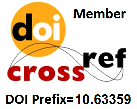About the Journal
Journal Information
Contents:
- About the Journal
- Research Areas
- Journal Details
- Focus and Scope
- Ethics of Scientific Research
- Frequency of Publication
- Impact Factor
- Indexing
- Copyrights
- Author Guidelines
- Authenticity and Plagiarism
- Privacy Statement
- Peer Review Policy, Guidelines & Process
- Article Charges
- Archiving Policy
- Appeals and Complaints
About the Journal
Libyan Journal of Environmental Science and Technology: (LJEEST) is an international, open-access, peer-reviewed by experienced researchers, platform that publishes high-quality, research papers. The journal places a strong emphasis on originality, and papers containing original research are valued. Authors may also submit extended versions of previously published conference papers/research. Papers are selected for publication using an anonymous double-blind peer-review process to ensure excellence, relevance, and readability.
Research Areas
LJEEST (Libyan Journal of Environmental Science and Technology) covers all topics related to the fields of engineering and science. Authors are invited to submit scientific papers on the following and related topics:
- Environmental sustainability
- Environmental legislation and management
- global climate change
- Changes in marine, freshwater, and terrestrial ecosystems
- Assessment and biomonitoring of pollutants
- Environmental pollution Air, water, soil
- Agriculture, Forestry, Land Use and Management
- Environmental Toxicology and Risk Assessment
- Noise and radioactive pollution
- Organic compounds in the environment
- Natural resources and environmental cycles
- Environmental treatments
- Liquid and solid waste and their treatment
- Oil and Bioprocessing
- soil erosion and degradation
- Desertification and land rehabilitation
- Environmental Microbiology
- Groundwater Chemistry
Journal Details
- Journal name: Libyan Journal of Environmental Science and Technology(LJEEST)
- e-ISSN: 2710--5237
- Journal type: Online
- Start year: 2019
- Official email: Ljeested@srcest.org.ly
- Publication periodicity: 3 times a year (April, August, December)
- Subjects: Ecological, Environmental Science and Technology.
- Indexing: Google Scholar, DOI
Focus and Scope
The objective of providing an open access platform for the Libyan Journal of Environmental Science and Technology is to make a genuine contribution to scientific research. The journal's editorial team is constantly working to improve the journal's indexing. The journal strives to provide high-quality research at a low cost.
First-class information
The Libyan Journal of Environmental Science and Technology focuses on providing its readers with essential and up-to-date scientific and technical data, supporting a continuous cycle of research, discovery, and applications in the field of research exploration.
Global publishing
Current and future authors can meet their information needs by accessing the Libyan Journal of Environmental Science and Technology database, which is maintained and distributed globally.
Scientific research
Environmental science is a field that requires extensive research and study. The Libyan Journal of Environmental Science and Technology focuses on the journal primarily aims to provide a platform for researchers in various disciplines of environmental science and technology, where high standards of teaching and learning are encouraged. The journal welcomes independent theories, research, practical/theoretical works, and applied reports/studies to contribute to a better understanding of technical challenges.
Ethics of Scientific Research
The Libyan Journal of Environmental Science and Technology places paramount importance on the ethics of scientific research, adopting the principles and guidelines of the Committee on Publication Ethics (COPE) as its fundamental ethical framework. Driven by a commitment to quality and integrity, all submitted manuscripts undergo a rigorous and comprehensive peer-review process conducted by a distinguished panel of expert reviewers with high competence, adhering to strict ethical standards at every stage of publication. To ensure the highest levels of originality and prevent unethical practices such as plagiarism and data fabrication, the journal's editorial team employs Turnitin software to examine and compare submitted content against previously published works.
To access the detailed guidelines of the Committee on Publication Ethics (COPE), please visit the following link: https://publicationethics.org
Key Principles of Scientific Publication Ethics Adopted by the Journal:
- Rigorous Peer-Review Process: As a peer-reviewed scholarly journal, the Libyan Journal of Environmental Science and Technology is committed to a meticulous research review process that guarantees the scientific merit of published research. The journal provides clear guidelines for reviewers to ensure the evaluation of original research according to the highest standards.
- Copyright and Originality: The Libyan Journal of Environmental Science and Technology retains the copyright of published works. Authors are required to submit a formal declaration confirming the originality of their submitted work, stating that it has not been previously published or submitted elsewhere, and that it does not contain any copyright-protected material without explicit permission from the rights holders.
- Disclosure of Conflicts of Interest: Authors are obligated to disclose any information that could be perceived as a potential conflict of interest prior to submitting their research for publication in the journal.
- Methodological and Data Details: In the interest of transparency and research reproducibility, authors must describe the data and methodologies used in their research with sufficient detail to allow other researchers to understand, replicate the study, and fully utilize the findings.
- Originality and Non-Redundancy: Submitted research should not contain any previously published information. If authors wish to include previously published figures or images, they must obtain written permission from the copyright holder.
- Combating Plagiarism: The Libyan Journal of Environmental Science and Technology considers plagiarism an unacceptable practice. Plagiarism includes the reproduction of text, ideas, images, or data from other sources, including the author's own prior publications, without clear and proper attribution of the original source. Therefore, any reused content must be placed in quotation marks with explicit citation of the original source. Furthermore, any work that references the design, structure, or language of prior work must be explicitly cited. All submitted research undergoes thorough plagiarism detection using Turnitin software. Should reviewers identify any instances of plagiarism during the review process, the journal reserves the right to reject the submission. If plagiarism is detected post-publication, the journal will conduct an investigation and take appropriate action in accordance with its policies.
- Correction of Errors: The Libyan Journal of Environmental Science and Technology is committed to correcting and publishing any significant errors identified in published research as promptly as possible following notification by readers, authors, or editors.
- Protection of Confidential Information: Information obtained during confidential services (such as reviewing research papers or grant applications) must not be used without the explicit written permission of the author of the work involved in these services.
The Libyan Journal of Environmental Science and Technology underscores its full commitment to these ethical principles to ensure the publication of high-quality scientific research characterized by integrity, originality, and a significant contribution to the advancement of knowledge.
Frequency of Publication
The Libyan Journal of Environmental Science and Technology is an open-access journal published three times a year (April, August, December). Submissions for the next issue are open until the deadline for submissions for the current issue.
Impact Factor
The journal has an impact factor in a number of databases:
- Arab Impact Factor
- Arcif
- Impact factor of scientific journals
Indexing
Google Scholar, DOI, Arab Impact Factor, Arcif, SJI factor & AJOL
Copyrights
Copyright for any article published in the Libyan Journal of Environmental Science and Technology is held by the authors. Articles published in the journal are distributed under the international license. Creative Commons Attribution, Non Commercial, No additional restrictions 4.0 https://creativecommons.org/licenses/by-nc/4.0/ This license allows others to download and share the original works with others provided that the author and the journal are appropriately credited, but users cannot alter the contents or use them commercially.
Open Access Policy
All articles published in the Libyan Journal of Environmental Science and Technology are open access and distributed under a license. Creative Commons Attribution-Non Commercial-No additional restrictions 4.0 International, which allows articles to be used non-commercially and freely distributed, provided the original work is properly cited.
Author Guidelines
Submission Preparation Checklist
As part of the submission process, authors are required to ensure that the submission complies with all of the following elements, and the submission may be returned to authors if it does not comply with these guidelines:
- The submission has not been previously published, nor is it being considered in another journal (or an explanation has been provided in comments to the editor).
- Application file in document format Microsoft Word
- Addresses provided URL to references where available.
- The text is single-spaced, Times New Roman using 10 point font; italics are used instead of underlining (except for headings), and all illustrations, figures, and tables are placed within the text at appropriate points rather than at the end.
- The text conforms to the stylistic and bibliographic requirements set out in the Guidelines for Authors.
Publishing ethics
Publishing a research paper in a scientific journal is a fundamental building block in the development of a cohesive and respected body of knowledge. It is a direct reflection of the quality of the work of the authors and the institutions that support them. Peer-reviewed articles support and reflect the scientific method. Therefore, it is important to agree on the standards of ethical behavior expected of all parties involved in the publication process: the author, the journal editor, the peer reviewer, and the publisher. The following responsibilities outlined for editors, authors, and reviewers are based on the Code of Conduct of the Committee on Publication Ethics.
Approval to publish
For all manuscripts containing details, images, or videos relating to individual participants, written informed consent for publication must be obtained from the participants and a statement to this effect must appear in the manuscript. Documents demonstrating consent for publication must be made available to the editor upon request and will be treated confidentially.
Authors' Guide
Authors of original research reports must provide an accurate description of the work performed and an objective discussion of its significance. The underlying data must be accurately represented in the paper. The paper must contain sufficient detail and references to allow others to replicate the work. Fraudulent or intentionally inaccurate statements constitute unethical and unacceptable behavior.
Authenticity and Plagiarism
Authors should ensure that they have written entirely original works, and if they use the works or words of others, they must be cited appropriately.
Copyrighted material (such as data, tables, figures or extensive quotations) must only be reproduced with proper permission and acknowledgement.
Researchers who utilize AI-assisted technologies in drafting their manuscripts are expected to limit their use to enhancing language quality and readability. Direct human oversight and meticulous review of the results are essential, and the authors bear full responsibility for the integrity of the scientific content.
In adherence to ethical publishing standards and to ensure transparency and foster trust among authors, readers, and reviewers, clear disclosure of any AI applications used in the writing process is mandatory within the manuscript.
It is worth noting that the journal relies on Turnitin reports to assess the originality of submitted works
Privacy Statement
Names and email addresses entered on this Journal website will be used exclusively for the stated purposes of this Journal and will not be made available for any other purpose or to any other party.
Peer Review Policy, Guidelines & Process
- All submitted manuscripts are reviewed by the editor-in-chief and, if deemed suitable, forwarded to the associate editor. If the paper is deemed suitable for potential publication, it is sent to two or more external reviewers from our database of experts.
- The Libyan Journal of Environmental Science and Technology uses a double-blind review process for all manuscripts. The identities of reviewers and authors are kept strictly confidential. The manuscript under review is not disclosed to anyone other than the reviewers and the editorial staff. Reviewers are required to maintain confidentiality regarding the manuscripts they review.
- Authors are expected to receive a preliminary decision on their manuscripts within 2–3 weeks of submission. Authors are asked not to send emails for urgent review, as the submission may be canceled. If the manuscript requires revisions, authors must submit the revised version within two weeks of submission. If accepted for publication, articles will be published within 2–3 weeks of acceptance.
Peer Review Process
- Upon receipt of a manuscript, the Managing Editor promptly acknowledges its submission by sending a confirmation email to the corresponding author, either on the same day or within 48 hours.
- Manuscripts that fall outside the scope and policies of the journal are screened and returned to the corresponding author within three working days, without undergoing peer review.
- The peer review process is overseen by the Editorial Board, under the leadership of the Editor-in-Chief. The journal employs a rigorous double-blind peer review system, ensuring that both reviewers’ and authors’ identities remain anonymous. Each manuscript is reviewed by a minimum of two independent experts.
- Reviewers are allotted a maximum of three weeks to evaluate the manuscript. The review is conducted using track changes and includes a detailed assessment based on the following criteria:
- Significance of the research
- Originality of the work
- Suitability of the research approach and experimental design
- Adequacy of experimental methodologies
- Quality of results and their presentation
- Relevance and depth of the discussion
- Soundness of conclusions and interpretations
- Clarity of presentation and article structure
- Accuracy and quality of language, including grammar
- Reviewers' comments, decisions, and recommendations are communicated to the corresponding author via email.
- For accepted manuscripts, authors are required to revise the work in alignment with reviewer feedback and submit the final version promptly. The decision of the Editorial Board is conclusive and final in all matters related to acceptance.
- Following publication, the corresponding author receives a formal email notification.
- The Libyan Journal of Environmental Science and Technology uses the anonymous double-review process (Double Blind Review), therefore, reviewers are required to adhere to this process.
Reviewer Guidelines
- The objectives of the Libyan Journal of Environmental Science and Technology from the peer review approach
Ensure thorough verification of research before publication.
Correct unintended errors to improve search quality.
Acknowledgment and appreciation to the distinguished reviewers who contributed to maintaining the journal’s high standards.
- Rules and instructions for reviewers
Only accept articles that fit your area of expertise.
If you are unsure of the full details when approached by an editor, only accept articles if you are an expert in the specific field.
Check your time availability, as the article review process can take a significant amount of time depending on the type and quality, averaging 1-2 days.
If you have any professional or personal relationship with the author, you are advised not to accept a review of the article.
- Review process
Confidential Review: The article must not be disclosed to any third party.
The reviewer is not allowed to contact the author.
The final decision on recommendations should be based on a set of specific criteria such as originality, structure, results, and ethical issues.
- Recommendations
After completing the assessment, a report should be prepared highlighting key points and relevant observations, with an emphasis on constructive comments devoid of any personal remarks.
Article Charges
The Journal of Ecological and Environmental Science & Technology operates without imposing any fees for article submission or processing. Additionally, we do not engage in any form of advertisements, nor do we generate any income through associated activities. Our focus remains solely on the dissemination of scientific knowledge and fostering research within the fields of ecology and environmental science.
Archiving Policy
LJEEST operates under an open access license, allowing articles to be made publicly available immediately in accordance with the terms of their respective Creative Commons license. For articles published under an open access license, LJEEST strongly encourages authors to share the Version of Record upon publication, rather than the Accepted Manuscript.
Authors are permitted to reuse the abstract and citation details (e.g., title, author name, publication date) of their articles at any time and across various platforms, including social media channels such as LinkedIn, Facebook, blogs, and Twitter. Whenever feasible, a link to the article on the LJEEST website should be included, ideally featuring the Digital Object Identifier (DOI) provided in the article's citation information online. The accepted version of the article may also be archived on the author's personal website or within their company/institutional repository or archive. Notably, self-archiving of the submitted version is not restricted by any embargo period.
The electronic backup and preservation of the journal's content are securely managed by site hosting company. A comprehensive policy outlines the procedures allowing LJEEST authors to archive copies of their work on personal websites, corporate platforms, and various subject-specific repositories. Furthermore, LJEEST is officially archived with Arcif, e-Marefa, SJIF, and AJOL
Appeals and Complaints
Appeals
Authors who believe that a decision on their submission was unjust have the right to appeal. To initiate an appeal, please submit a formal letter to the Editor-in-Chief within 10 days of receiving the decision. The letter should clearly outline the reasons for the appeal and provide justification for why the decision is considered unfair.
Complaints
For concerns regarding the Journal’s policies, procedures, or the conduct of editorial staff, please direct your written complaint to the Managing Editor or Editor-in-Chief via email. Complaints should focus strictly on the facts of the matter and be presented in a clear and concise manner.













